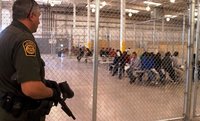Engagement Works
I am pleased to announce that we have taken another step forward in reaching out to the American public by creating a webpage on community outreach. This page includes recent news of interest; links on immigration information, filing complaints on travel or civil liberties concerns, and training resources that build cultural competency; and, video of Secretary Chertoff speaking about the importance of community outreach and the proactive role that American Jewish, Arab and Muslim communities can play in our national security.
After almost six years of working with racial, religious and ethnic minority communities around the country, we can say with certainty that outreach pays concrete dividends.
For example, organizations representing Jewish and Sikh communities have helped us improve our ability to screen religious travelers. The Sikh community has partnered with our office and the Federal Protective Service to develop training posters on how security guards should screen people who wear or carry certain religious items. We also co-sponsored an excellent seminar on violent extremism with the Anti-Defamation League.
When Hurricanes Gustav and Ike hit the Gulf Coast earlier this fall, we worked with our colleagues from immigration groups to ensure that evacuation materials were translated and messages were spread within communities. We are convinced that lives were saved.
Our relationships with disability rights organizations have helped us attract accomplished new employees. These organizations have also supplied subject-matter experts to help us analyze the emergency operations plans of a dozen major cities. This groundbreaking analysis was a key component of the Department’s Nationwide Plan Review, which set the agenda for improving emergency management post-Katrina.
We have also invested a great deal in outreach to American Arab and Muslim communities. We have regular roundtables with government officials and community leaders in Washington, Detroit, Houston, Chicago, Boston and Los Angeles. Our senior leaders have briefed groups when a new policy is announced, such as recently when Kip Hawley briefed the community groups on Secure Flight—an initiative that will decrease watchlist misidentifications. Secretary Chertoff has personally invested a great deal in this effort – speaking to the South Asian Chamber of Commerce in Houston, meeting with inter-faith religious leaders at a mosque, discussing issues with Pakistani-American doctors, and holding roundtables with students from these communities.
After almost six years of this engagement, we have tangible evidence that engagement between the Department and these communities is effective. Consider the following
- Earlier this year, we held a call with a number of community leaders to talk about the imminent release of a European film critical of Islam. As a result, several prominent Muslim leaders in this country wrote and spoke to their communities about the appropriate response to a film of this sort. Their work decreased tensions among Muslim communities and helped to prevent a repeat of the Danish cartoons controversy.
- At our Houston roundtable, an FBI colleague made a presentation about the threat of extremism among young people. The participants understood the message and wanted to address the concern locally and proactively. They organized a program for the imams of 11 of the largest mosques in Houston to all speak out against extremism on a single Friday, and then developed an anti-extremism curriculum that was taught in the mosques in subsequent weeks.
- After Katrina hit, disability advocates filled several trucks with medical equipment and supplies. However, they did not have enough money to pay for the trucks to drive across country to the Gulf Coast. When a Muslim civil rights organization heard about the situation, it raised the money within 24 hours, and the trucks were on their way.
- Community leaders have offered to encourage the youth in their communities to put aside skepticism and seek employment with the federal government. As a result, we were able to create the National Security Internship, a partnership between the FBI and DHS that brought almost two dozen Arabic speakers into our intelligence divisions. Next summer’s class will be even larger, and will expand to bring Arabic speakers into TSA and ICE.
Daniel W. Sutherland
Office of Civil Rights & Civil Liberties
Labels: About the Department, civil rights and civil liberties, diversity, partnerships










